From the art of The Vatican to Lawrence of Arabia.
The showrunners of The Lord of the Rings: The Rings of Power are bringing us back to Middle-earth. Now, with the entire season now out showrunners J.D. Payne and Patrick McKay have been sharing influences and the creative process behind their most-beloved and most-challenging aspects of the show.
From many interviews across the web, here are some of those in their own words.
On Building Relationships
“From the beginning we wanted to build a relationship between Sauron and Galadriel.” – J.D. Payne, Co-Showrunner
“I hope after the last episode airs, viewers watch the whole season again, which is now a different experience… We were concerned about a situation where the part of the audience steeped in lore is six or seven episodes ahead of the characters. If deception is an important part of the journey, we wanted to preserve that experience for book readers too.”
Patrick McKay, Co-Showrunner
“Season one opens with: Who is Galadriel? Where did she come from? What did she suffer? Why is she driven?” says Payne. “We’re doing the same thing with Sauron in season two. We’ll fill in all the missing pieces. Sauron can now just be Sauron, like Tony Soprano or Walter White. He’s evil, but complexly evil. “
Patrick McKay, Co-Showrunner
Galadriel’s in this place of betrayal and anger and mad at herself and at him, and Sauron’s really coming from this place of, “No, no, no, no, no. This is good. It’s all been leading up to this. This is what we’ve been doing all season. By combining our powers, look at what we’ve achieved. We could do so much more together.”
Gennifer Hutchinson, co-writer Episode 2 & 8
Halbrand’s first lines to Galadriel on the raft are: “‘The tides of fate are flowing. Yours may be heading out.’ That’s the same line that Galadriel says to Frodo when the ring comes into her orbit in LOTR. She’s repeating the first thing Sauron ever said to her.” – J.D. Payne to Vanity Fair
Introducing Sauron
“We began filming before telling Charlie Vickers he was Sauron. After filming episode two, we talked to Charlie during the pause we took because of COVID, and then episodes three through eight he was fully aware.” – J.D. Payne to Vulture
“It’s not an option calling him Annatar because the audience would know ahead of the character.” – McKay on The Ringer podcast. McKay also admits the clues are all there from the start, “in his very first shot, he’s looking over his shoulder with one eye. His second line is ‘Looks can be deceiving.'”
Vulture asked: “Why introduce Sauron through the form of this human disguise?“
Patrick McKay responded: ‘One of the earliest ideas we had for the storyline came from the moment in The Fellowship of the Ring when Galadriel is tempted by Frodo’s offer of the Ring. She talks about how well she knows and understands Sauron, and there’s a quote where she says, “I know his mind, and he gropes ever to know mine, but still the door is shut.” She clearly has a darkness — that turning down the Ring is a test she feels she has to pass to finally go West — and that the darkness in her is linked with her feelings about Sauron.’
“We wanted to do an origin story for Sauron. We didn’t want to make a show that was about the hunt for Sauron, but we love the idea of Sauron as a deceiver who could, hopefully, deceive some of the audience.”
Patrick McKay
Seems that the showrunners were trying to pull off a mic-drop moment only the greatest directors have ever successfully done, per this Empire magazine question from Patrick to James Cameron:
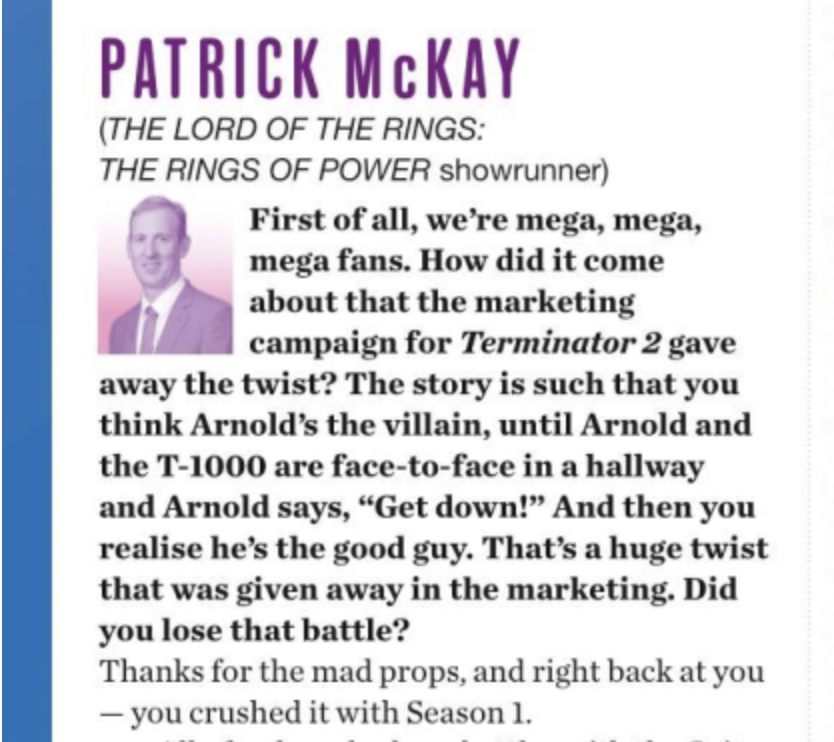
We tried to set it up where every single line would be true to a certain extent, no matter who he is.
Patrick Mckay
On Inspirations That Few Viewers Spotted
Patrick tells The Ringer podcast that the entire concept of Galadriel and Halbrand meeting at sea is based on the Neo-classical Romanticist painting “The Raft of Medusa” which hangs in the Louvre, and is surprised nobody picked up on the connection. The painting depicts the real life story of an actual boat named the Medusa that crashed at sea and led to cannibalism among the survivors on the raft.
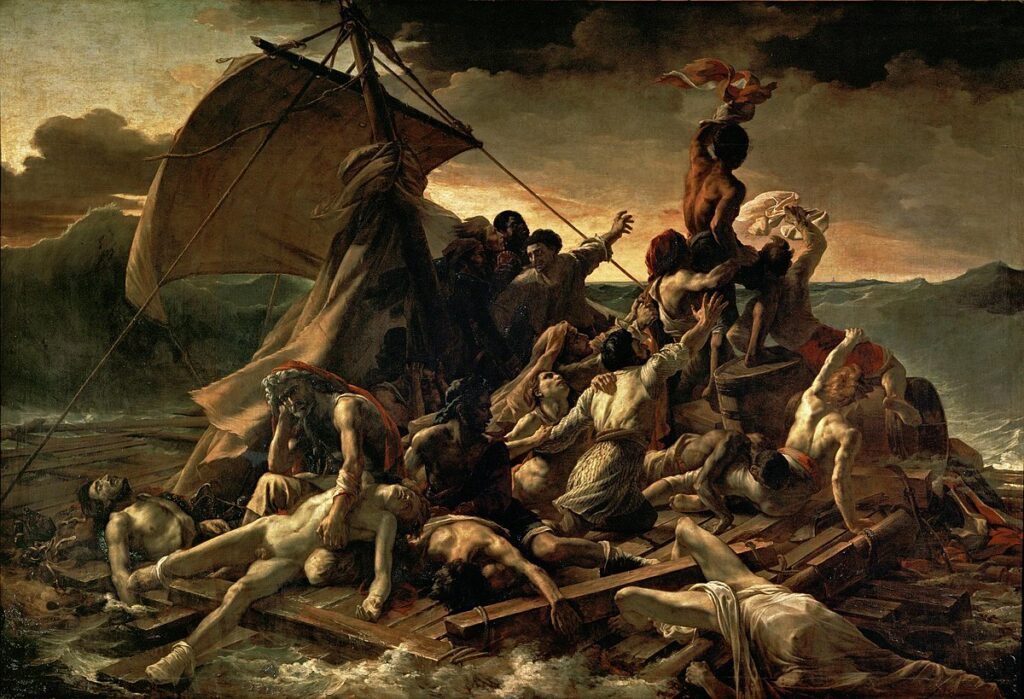
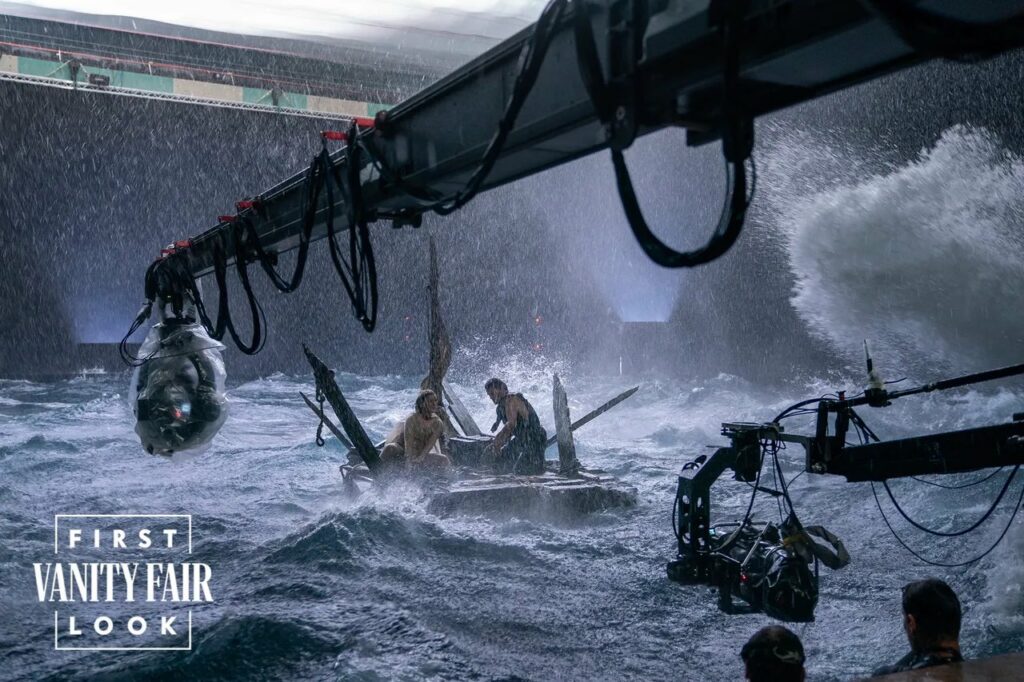
“There’s something that Milton does in Paradise Lost where he makes Satan a really compelling character. In some ways, he’s the first antihero… and you (the reader) are unconsciously won over, so that you perceive your own fallenness and your need for redemption.” – Patrick McKay
“For my final audition, I had to do a speech from Paradise Lost. Literally, as Satan.” – Charlie Vickers, who plays Sauron. “By no means is this the definitive portrayal of Sauron. I think there’s comfort in the fact that it’s just adding another colour to what is already a really colourful page.”
In Episode 7, we see Galadriel and Theo hiding under a log. But that’s where the connections to Bakshi’s and Jackson’s films end. “It was written that they were hiding under a log, so it was ultimately led by the scripts I don’t think we ever consciously went back to the films and said ‘we want to do it like that'” says Alex Diesenhof, the DP for the episode, in Newsweek.
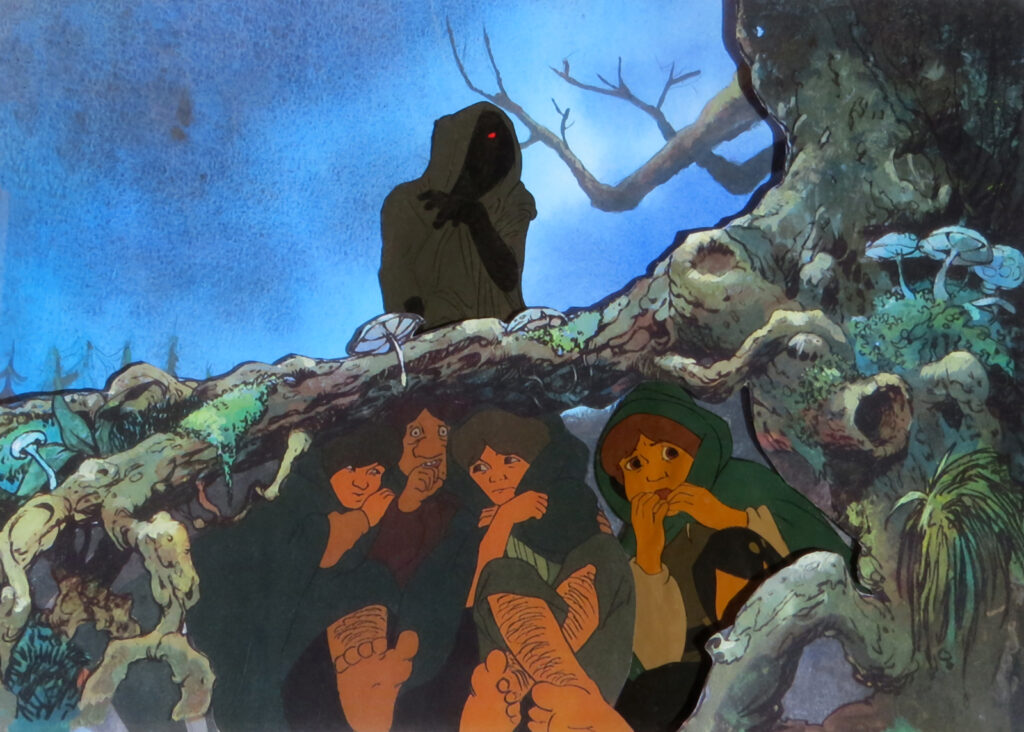
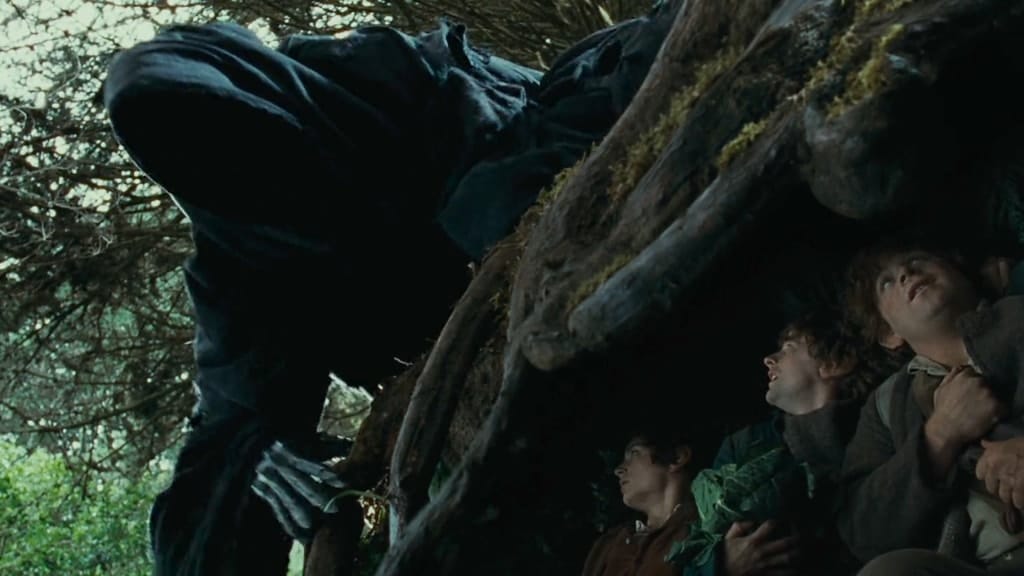
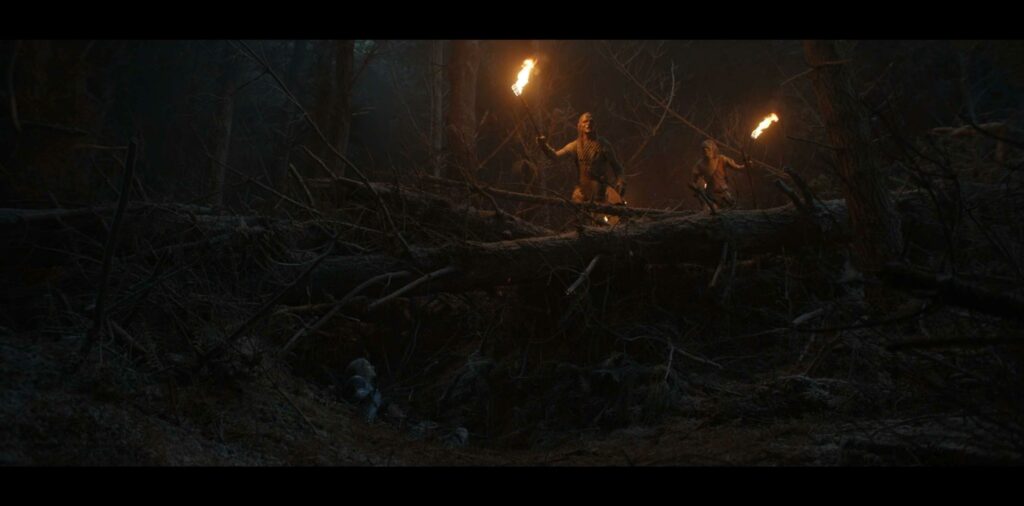
All of us on the ground who’ve made the show, we approached it with love and so many of us are huge fans, and we just want people to live in Middle-earth again, just like we want to live in Middle-earth again.
Alex Diesenhof, director of photography
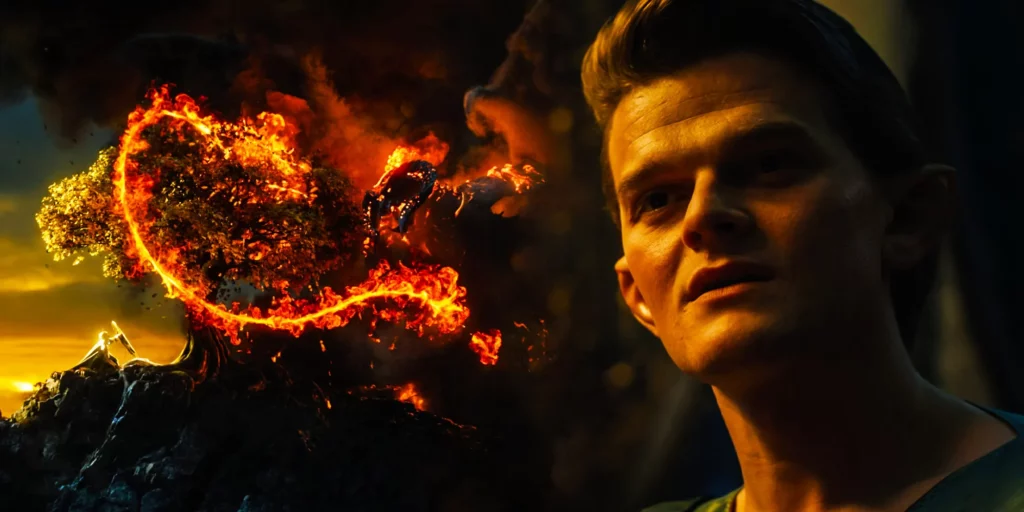
On Mithril and Legends
One of the most controversial ideas put forth in The Rings of Power is the source of Mithril’s magic. Fans worldwide — from the Tolkien Professor, Corey Olsen, to the Tolkien Society, to nearly all lore YouTubers — universally loathed this effort to expand the Legendarium. The Showrunners justify their choice:
“What if there’s a grand unification theory that could connect the light of the Two Trees of Valinor, which went into the Silmarils, to the rings? The three elven rings were at least partially made of mithril… It was a way to connect many parts of the canon, including the elves fading.”
J.D. Payne, co-showrunner
“Mithril is unusual in Middle-earth. It’s Tolkien’s vibranium, or adamantium, or like the one in Avatar, unobtainium. I would trust Elrond’s read on this piece of lore.”
Patrick McKay, co-showrunner
“I think we’re quite used to the elves doing exactly the right thing and knowing exactly what to do. And that’s not necessarily the case here. [Galadriel] knows that if she [reveals Sauron to Celebrimbor], the rings wouldn’t get made. She needs the rings to be made so that the elves can stay in Middle-earth and continue to fight him. But I don’t know whether that’s the right thing to do!” – Morfydd Clark
“She’s gonna get a bit more magical! I’m really looking forward to that. The gift, or curse, of foresight, I found quite interesting.”
Morfydd Clark, on Galadriel getting her ring for Season 2
Screenrant caught up with the boys to talk about those not-yet-Nazgûl witches.
These witches are lesser conjurers than one of the wizards would be, and are bested here, but they escape in another form. While the visual language is a little similar to the Nazgûl, we’re also thinking about Macbeth and we’re thinking about the old crones and the three witches and just trying to come up with something strange and weird. We know they come from Rhûn, and we know there are magic cults in Rhûn, which is one of the things Tolkien writes about. So maybe there’s a slightly different kind of magic and we can peel back the layers in future seasons.
Patrick McKay
J.D. Payne continues that we haven’t seen the last of the three witches, “were they just temporarily vanquished? I think that’s a story point that people can be thinking about… That’s him seeing into the Unseen world. The ring takes you into that place where you can see the true form of things.”
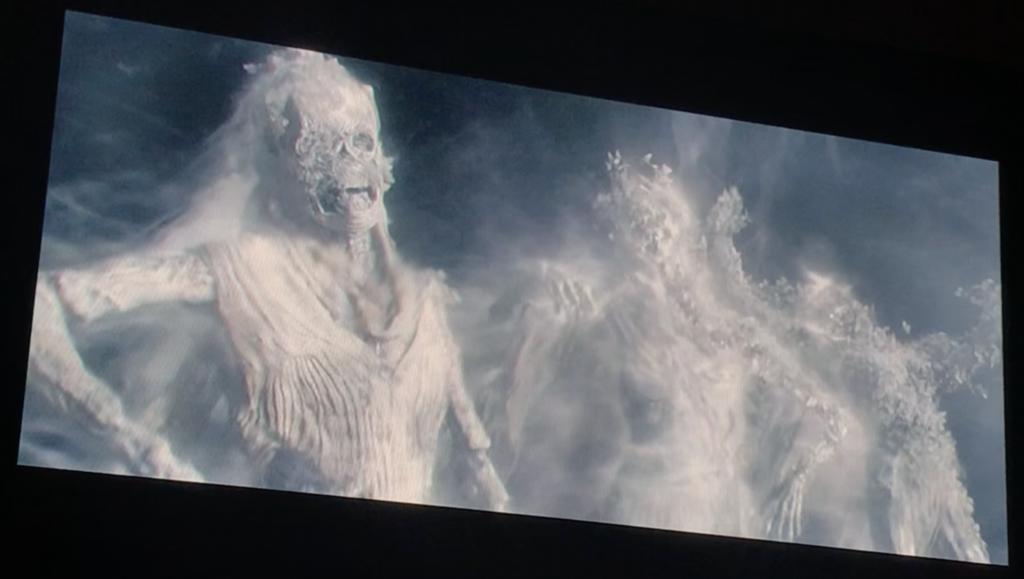
Númenor
The showrunners tell Joanna Robinson at the Ringer podcast that they are shocked nobody has compared the reveal of Elendil to its inspiration from Lawrence of Arabia. In the classic film, considered one of the top 5 films of all time, the shadow scene represents the title character Lawrence adopting his savior-ego complex and leading the Arabs to potential freedom. In Rings of Power season one, Elendil loses his children to politics and war, but will eventually lead some Númenorians to safety and freedom.




Above: Lawrence of Arabia, Rings of Power episode 2
“If you look back over her trajectory this season, it seems like Isildur’s sister has been pulled into the Pharazôn camp, and that could mean big things for Númenor moving forward. Could she touch the Palantir and increase her sympathies toward the faithful, Or take issue with the idea that the queen has been using an Elven artifact and go the other way?” – via Vulture
“There was more about Isildur not wanting to be a sailor. We could do a whole season on that.” J.D. Payne to The Ringer
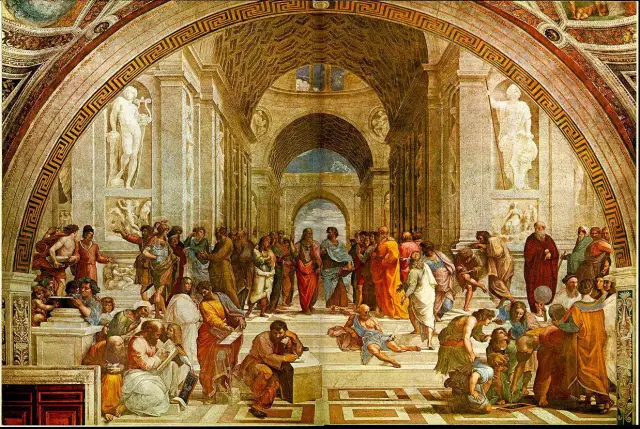
Númenor’s aesthetic is directly based on the classical Raphael portrayal of Athens as seen in the Vatican, McKay tells the Ringer podcast. Tolkien famously based his myth of Númenor on the ancient Grecian stories of Atlantis, made popular by Plato in his Athenian storytelling. In Letter 163 J.R.R. Tolkien admitted, “I have what some might call an Atlantis complex. … I mean the terrible recurrent dream (beginning with memory) of the Great Wave, towering up, and coming in ineluctably over the trees and green fields.”
Responding to Fan Criticism
Hollywood Reporter asked the writers to respond to five constant criticisms of the lore, paraphrased here:
- Dwarf women have beards. “Tolkien has answered this particular question both ways.”
- Elves all have long hair. “If Tolkien ever wrote a comprehensive style guide to hairstyles, I would love to see it.”
- Galadriel is too masculine. “Her nickname [by Tolkien] is “Nerwen,” which means “man-maiden.”
- Costumes are too new. “Guess what? Sometimes clothes are new.”
- Pacing is too slow. “Tolkien will take his time and let you sink into characters, into a journey, and… I hope people will have the patience to settle in for a Tolkien epic.”
“The storytelling will be different next time, not because of the response to the show, but because of the experience of making the show for us. We’re certainly listening to the critics and to our audiences. You don’t want to give any one voice too much weight, but figure out what people are responding to.” – via Vulture
“We felt it was very important that season one be about reintroducing Middle Earth in this new era. Introducing all of these kingdoms, and all of these peoples and all of these characters and knowing what was important to them, and what they had at stake.” – Patrick McKay, who still needs to introduce 16 leaders of men and dwarves to be corrupted by the rings of power.
“People of the world will think everything, love/hate & in between, I’m quite sure, but it certainly seems like everybody’s talking about it and people are watching. I think we always knew there would be a lot of chatter from all corners, and it’s good to be talked about.” – Lindsey Weber
“It’s not a mystery it’s a character journey. Watching fans fight each other bums me out. Sauron enjoy seeing us tear each other part” – J.D. Payne
“Some portion of audience don’t want to go in journey of discovery. That surprised us. We thought fans would enjoy Galadriel not having husband and child.” – Patrick McKay on The Ringer podcast
“The guys really wanted to devise a story that would work from service level the first time and then would work on a whole new level when you saw it again with the full knowledge of the season.” – Lindsey Weber
“What matters to us is if it’s entertaining enough that people are digging into it and debating it. One of the big things we learned was even when it’s a small scene, it always has to tie back into the larger stakes. It has to be about good and evil and the fate of the world or it doesn’t have that epic feeling you want when you’re in Tolkien.” – Patrick McKay
“Bezos is a huge fan of Tolkien and has a great knowledge of the lore. The whole idea of why we got the rights to begin with was to tell the story of good versus evil — of people coming together from all different worlds to fight evil, really. Leaning into light was the other thing that was really appealing to everybody — bringing something to our global customer base that is hopeful and has light and that a family can watch.” – Jennifer Salke, president of Amazon Studios
Good Things Are Worth Taking Time
“We wanted to explore what it meant for Galadriel to, who had been right a lot, to be wrong, really, really wrong for a minute. We wanted her to have to live with those consequences, and in a way that she couldn’t fix in the short term.” – Lindsey Weber, Executive Producer formerly from Bad Robot, on why the volcano wasn’t the triumphant climax of season one.
“JD and Patrick talked about Stalingrad and Battle in the Streets, not sort of full epic but more hand-to-hand and brutal with surprising twists and turns.” – Lindsey Weber
Mystery Boxing The Obvious
When quizzed about the Gandalf-like similarities of The Stranger’s voice and accent Patrick McKay responded: “The specifics of these things matter so much. Daniel Weyman, who plays The Stranger, developed a voice with vocal coach Leith McPherson that has a little twinge of the Irish lilt the Harfoots have. Whatever name he may one day be known as is not actually important at this stage of his journey. What matters at this stage is… his own relationship to power and good and evil and darkness and light.”
“I was playing what was put in front of me. I felt I could really play it honestly.” – Daniel Weyman, who is following his nose to Rhûn, wasn’t told his character’s name at first.
“There’s even references to Gandalf himself possibly coming much earlier in some different form — he ‘walked among the elves’ — there’s a story to be told with a wizard in this age feels in harmony with Tolkien’s canon.” – Showrunners J.D. Payne and Patrick McKay
“Apples have a lot of mythological resonances in cultures really across the world. There’s, obviously a biblical idea. I mean, it’s also commonly associated with the tree of knowledge of good and evil. The taking of fruit in a garden setting is something that portends kind of a loss of innocence, a leaving of Eden and heading into the difficult world. But rather than eat the apple, he holds on to the apple, as you know, holding onto the friendship.” – J.D. Payne
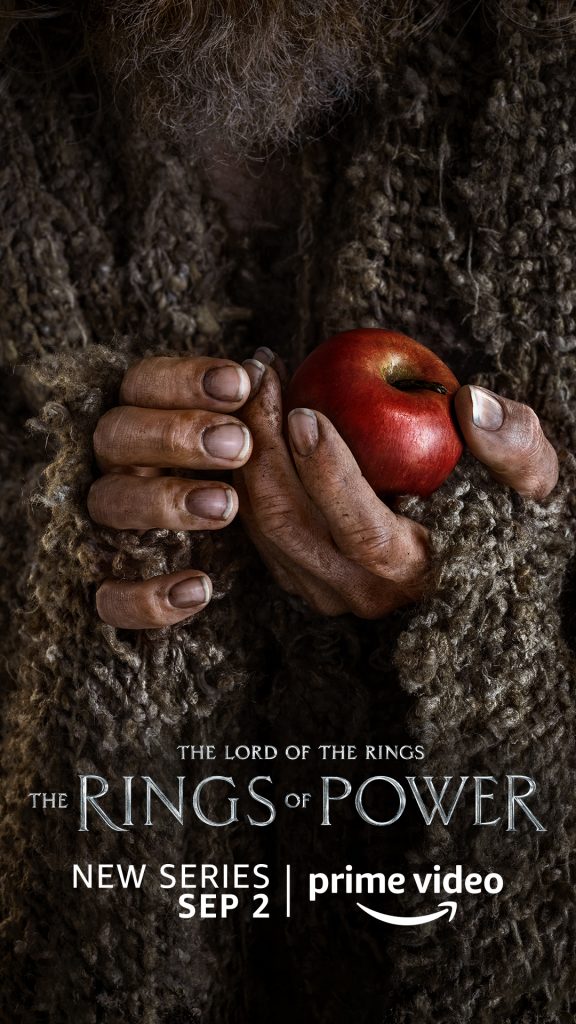
Sticking to the Plan
Lindsey Weber, Rings of Power producer who previously produced Star Wars Episode 9: The Rise of Skywalker, told the Ringer that “their (Patrick and J.D.) passion for and knowledge of Tolkien—combined with their clarity of vision for the whole series, across multiple seasons—was uniquely impressive.”
“We don’t want to make something disposable,” Payne says. “Carrying the responsibility of this material and this man’s life’s work, we aspire to making something that’s special and not like anything else you’ve seen before. … It’s not ours. We have a responsibility to this world and this history and this mythology that this guy created that means so much to these people and want to do right by it.”
J.D. Payne
“I wouldn’t say we’re over-correcting for any of it, but we’re certainly listening to people’s responses.”
Patrick Mckay
McKay tells Vanity Fair in a season-ending interview: “In the fourth episode, she asks him for advice, and he says basically, “the way you beat your enemies is to figure out what they need and figure out how to give it to them. Help them master their fear. And then you can master them.” And that’s exactly what he’s doing to her the entire season — maybe what he’s going to do to everybody over the following seasons. That’s his modus operandi.”
Here’s some reactions from the writers of Season 1 of The Lord of the Rings: The Rings of Power, now streaming all episodes FREE with your existing Prime membership that most people already have for free shipping.
Sources:
- Vulture: The Rings of Power creators explain Sauron’s identity and their plan to explore the edges of Tolkien’s map
- Empire Online: The Lord Of The Rings: The Rings Of Power – Unpacking The Finale’s Secrets (And More) With The Cast And Crew
- Deadline: ‘LOTR: The Rings Of Power’ Season 1 Finale: Showrunners & EP Talk Sauron Twist, Tease “Grittier” Season 2, & New Characters From Tolkien Canon
- The Hollywood Reporter: ‘The Rings of Power’ Showrunners: Sauron Will Be Like Walter White in Season 2
- Variety: Amazon Studios Head Jennifer Salke Breaks Down the $700 Million ‘Rings of Power’ Gamble and Plan for MGM Integration
- The Hollywood Reporter: ‘The Rings of Power’ Showrunners Break Silence on Backlash, Sauron and Season 2
- The Ringer: Amazon’s ‘The Rings of Power’ Was the Streaming Bet of the Year. It Was Also a Bet on an Unlikely Duo.
- Vanity Fair: The Rings of Power Creators Reveal How Sauron Hid in Plain Sight


